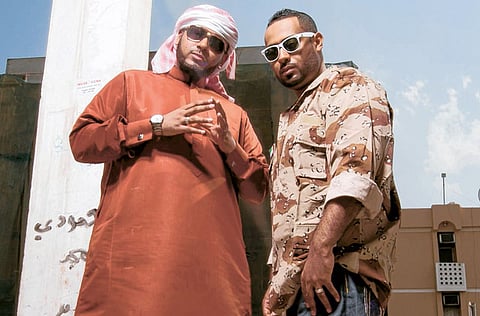Desert Heat go 'Arabish'
Emirati duo, known for songs about Arab identity, are creating new genre of music

Every season needs an anthem. While the jury's still out on whether or not this year's summer song is Katy Perry's Last Friday Night or LMFAO's Party Rock Anthem, for the UAE it will have to be Cruzin. At least that's what Emirati rap duo Desert Heat want their new single to be.
Released last week, the song's video, featuring Bahraini singer Hassan Bin Shams and shot across Dubai, is already riding the YouTube wave.
"We wanted to release it on the first day of Eid but we were not happy with the first version. So we went back to the editing table, thus the delay," says Salim Dahman Al Amoudi, explaining the "summer anthem's" late arrival.
One half of the hit rap group, Al Amoudi, who goes by the stage name Illmiyah, says the track was written to represent Middle Eastern youth.
"We wrote it after we realised there were so many anthems but not one that represents us. It's a feel-good song, about the day in the life of a Middle Eastern youth," he explains.
"We want to show we are not always serious, not all super strict and conservative and that we also go out, party — maybe not in a way others do by getting drunk — and like having a good time."
The video was filmed across two days in Karama, Jumeirah Beach Road and The Palm, Jumeirah.
Al Amoudi also revealed to tabloid! he is working on a solo album, his first without brother and band mate Abdullah Dahman (aka Arableak), called The Future of Arabia's Past, to be released in November. A new Desert Heat album is also in the making for a 2012 release, he adds.
"Cruzin' is a warm-up single for my album," he says.
Major artists
Formed in 2002, Desert Heat launched their debut album When The Desert Speaks in 2008. The duo has gone on to open for major artists including Snoop Dogg, 50 Cent, Ludacris, and Akon. The album has sold more than 35,000 copies to date.
"Based on the rating system in the Middle East and North Africa [region], if you sell 5,000 albums, you get a gold rating. 10,000 is platinum. So this means the album's gone three times platinum."
But the album, admits Al Amoudi, was not the breakthrough the band had hoped.
"We are pleased with the way it's done, yes. But we hoped more would have happened," he says. "But it's a learning experience. When we released our album we thought it was the right time but I think we were a bit ahead of our time. The whole idea of two Emiratis rapping in English and Arabic in kandouras was quite radical then I think.
"But in spite of all that, I'm glad it has sold really well in the UAE and across the GCC and in Germany, Australia and Canada."
The album was, however, banned in Saudi Arabia and Kuwait. "To this day, we still don't know why it was not allowed to be released," says Al Amoudi.
Known for their songs about Emirati and Arab identity, the rapper says his new album will be more personal.
"I speak a lot about my personal struggles. There are so many misconstrued notions about our identity as Emiratis. I've written about the discriminations we face in our own country, the relationships we share," he says.
He also wants to create a new genre for his music. "Because Desert Heat raps in both English and Arabic, we've called it Arabish hip-hop," he says.


